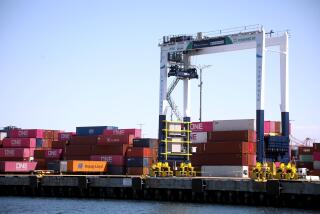Developer Pulls Plug on Power Plant in Chula Vista
- Share via
A San Diego company has canceled plans to build a controversial power plant in Chula Vista, angrily blaming state officials for failing to guarantee that the plant would turn a profit.
The announcement from Ramco Inc., made public Thursday, is the latest setback to Gov. Gray Davis’ campaign to get more electricity on line this summer. But one state official characterized the decision as evidence that California is now dealing with power companies from a position of strength, and can afford to turn down projects if the price isn’t right.
“That’s the exact position California wants to be in, frankly, where we can negotiate and, if we need to, walk away from the table,” said Oscar Hidalgo, a spokesman for the state Department of Water Resources. “So we’ll move on to other, more willing participants.”
Ramco apparently gave up after failing to strike a deal with the department for energy from the proposed plant, which would have been near a community recreation center and elementary school in Chula Vista, a city of 173,000 in southwestern San Diego County.
The plant would have provided 62 megawatts of “peaking” power, which is primarily intended for use during periods of heaviest electricity use. Sixty-two megawatts is enough to serve about 50,000 homes.
The developer’s announcement follows the decision of another San Diego company to withdraw plans for a plant in the Baldwin Hills area of Los Angeles, also in the face of community opposition. State officials conceded earlier this week that several other power plant projects appear to be behind schedule.
Chula Vista Opposed Ramco Power Plant
The Chula Vista City Council had opposed the Ramco project, which would have been built next to another new power plant in a highly urbanized area that is a jumble of industry, residences and other uses. The first plant began operating around July 1.
City officials had complained that the proposed plant would run initially without advanced pollution control devices, and, together with other new and proposed plants in the area, would have a disproportionate impact on a poor, predominantly Latino population. Some community activists opposed the plant on similar grounds.
Despite the opposition, the Energy Commission approved the plant’s license on June 13.
The company did not mention community opposition in its letter to the commission, and Ramco officials did not return telephone calls seeking comment Thursday. Opponents reacted with relief that the plans were being scrapped.
“We’re thrilled,” said Michael Meacham, special operations manager for the city of Chula Vista. “Regardless of the reason for withdrawal, we’re happy about it.”
Josie Lopez-Calderon, president of San Diego’s Mexican American Business and Professional Assn. and a leading opponent of the plant, was similarly pleased, and said the community opposition had led to the company’s withdrawal.
“I think if it was solely for the reasons they’ve given, all the other peaker plants would be pulling out, and I don’t see that happening,” she said. “So I think our concerns might have had some effect.”
Robert Laurie, the state energy commissioner to whom the company’s letter was addressed, said that he was not sure he understood the company’s rationale, but that it seemed clear that Ramco was unhappy with the Department of Water Resources. Since last winter, when the state’s large investor-owned utilities became unable to pay for their own energy purchases, the agency has been buying most of the state’s electricity.
“To me, it called into question what the policies of DWR were,” Laurie said. “Are they seeking to add power or are they not seeking to add power?”
In his letter, Ramco President Richard McCormack wrote that the company had been optimistic that the department would “provide the credit support” for the company to supply power to the Independent System Operator, which runs the statewide electrical transmission grid. “Unfortunately,” he said, the department had “specifically rejected such support.”
Officials at Cal-ISO and the department said they didn’t understand McCormack’s comments.
Ramco Couldn’t Foresee ‘a Reasonable Return’
The letter also said that Ramco needed to expect “a reasonable return on its investment while dealing with a credit-worthy entity in an environment where the sanctity of contract exists. There is simply no evidence that we can see, even on the horizon, that would suggest conditions will improve to the point where Ramco could once again consider investing in new power plants in California.”
Hidalgo, the department spokesman, said the agency still intends to sign contracts with energy providers, and is willing to continue talks with Ramco, but can now afford to be pickier than it was earlier this year, when it was criticized for signing more than $40 billion in long-term contracts at rates that some considered exorbitant.
Gary Ackerman, a spokesman for the Western Power Trading Forum, an organization of power traders and generators, said he didn’t understand why Ramco’s failure to sign a contract with the department would doom the project. After all, he said, the agency is not the only buyer of electricity.
“You could take market risk and build that plant,” he said. Abandoning it “doesn’t make any sense.” He said he knew of no other energy generator contemplating a similar pullout.
Rob Schlichting, a spokesman for the Energy Commission, noted that Ramco could still build the plant. Under the terms of its license, the plant would have to be completed by Sept. 30.
More to Read
Sign up for Essential California
The most important California stories and recommendations in your inbox every morning.
You may occasionally receive promotional content from the Los Angeles Times.













